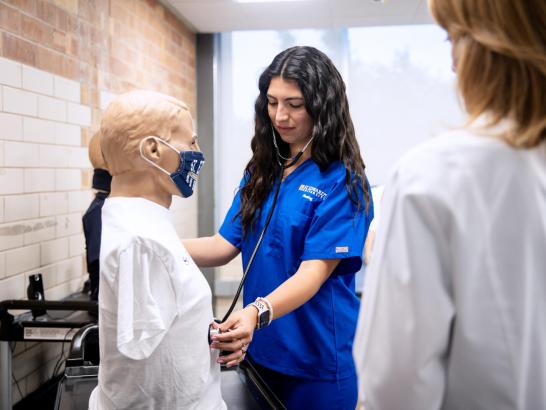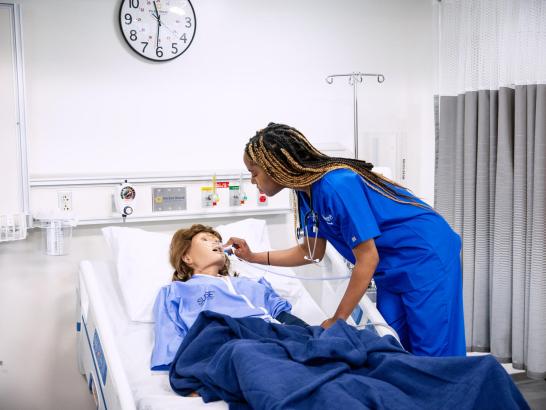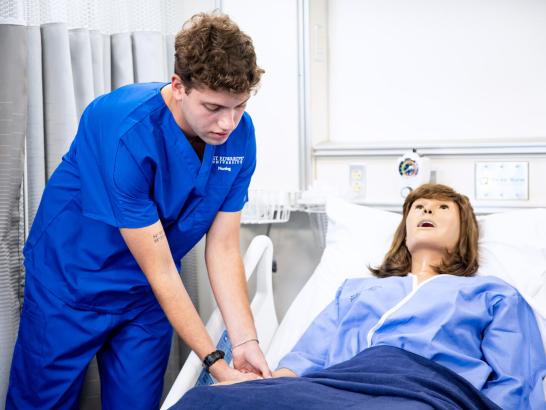Nursing Programs That Reflect Our Commitment to a More Just World
The social-justice mindset of St. Edward’s reaches far beyond our hilltop campus, impacting Austin and contributing to the greater good and well-being of communities and the world.
Guided by our Holy Cross mission and strategic plan, the core values of our Nursing programs focus on academic excellence, respectful care, integrity, ethics and social responsibility.
Graduates of our programs are uniquely positioned to address issues of disparity, justice and equity within healthcare, and to support culturally relevant care. In addition, the diversity of our graduates helps strengthen diversity within the nursing profession. Research shows that increasing diversity in the nursing workforce can help mitigate health disparities.
Nursing Programs
The Department of Nursing offers three exceptional pathways designed for a variety of students pursuing a Bachelor of Science in Nursing.

Traditional Bachelor of Science in Nursing (TBSN)
The Traditional Bachelor of Science in Nursing (TBSN) pathway gives undergraduate students an option for earning their first bachelor's degree, the BS in Nursing.

Accelerated Bachelor of Science in Nursing (ABSN)
The Accelerated Second Degree Bachelor of Science in Nursing (ABSN) pathway gives students who previously earned a Bachelor of Arts or Bachelor of Science degree in another discipline an option for earning their BS in Nursing.

Registered Nurse to Bachelor of Science in Nursing (RN to BSN)
The unique flexibility of our Registered Nurse to Bachelor of Science in Nursing (RN to BSN) program gives practicing registered nurses several options for earning their BS in Nursing. Students can choose between full-time and part-time course schedules, with classes offered in online, in-person and hybrid formats.
Take a Tour of the New Nursing Lab Spaces
The baccalaureate degree program in nursing at St. Edward’s University accredited by Commission on Collegiate Nursing Education.
Program Disclosures
The baccalaureate degree program in nursing at St. Edward’s University has received initial accreditation from the Commission on Collegiate Nursing Education. The pre-licensure BSN program has received initial approval from Texas Board of Nursing Education.
The master’s degree program in nursing and post-graduate APRN certificate program at St. Edward’s University is pursuing initial accreditation by the Commission on Collegiate Nursing Education. Applying for accreditation does not guarantee that accreditation will be granted.
The Department of Nursing has determined that completion of the Bachelor of Science in Nursing program options and pathway prepares a student to take the national licensure examination for registered nurses (NCLEX-RN®). Passage of the national exam is required for licensure in all 50 states and U.S. protectorates. It is an individual’s responsibility to understand, evaluate, and comply with all requirements relating to national certification exams for the state in which he or she intends to practice as educational requirements may vary widely including, but not limited to, the number of clinical hours required by the state as well as specific coursework. Nursing boards may also require additional information, including, but not limited to, documentation verifying citizenship and/or right to work (i.e. social security number) as well as criminal background checks.
To obtain information for nursing professional licensing boards, please see the National Council of State Boards of Nursing contact page.

